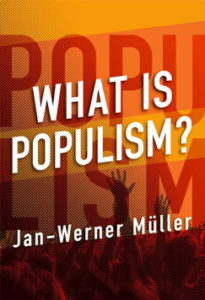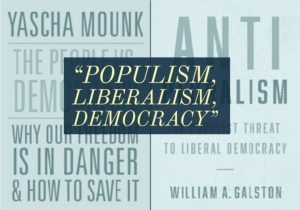 Has the West hit peak populism? After all, populist politics has exploded in the West this decade. According to an index compiled by the Bridgewater hedge fund, for example, the proportion of voters in industrialized countries choosing anti-establishment candidates surged from about 7 per cent in 2010 (its level during most of the postwar years) to 35 per cent in 2017, The FT’s Gillian Tett writes:
Has the West hit peak populism? After all, populist politics has exploded in the West this decade. According to an index compiled by the Bridgewater hedge fund, for example, the proportion of voters in industrialized countries choosing anti-establishment candidates surged from about 7 per cent in 2010 (its level during most of the postwar years) to 35 per cent in 2017, The FT’s Gillian Tett writes:
A new Ipsos survey suggests that 64 per cent of people around the world aged 16-74 currently feel a need for “a strong leader to take their country back from the rich and powerful”, while 49 per cent feel that “to fix the country we need a strong leader willing to break the rules” and some 62 per cent “feel that experts don’t understand the lives of people like them”. About two-thirds think the economy is rigged in favour of the rich and powerful, and that the system is broken. The good news is that these numbers have not dramatically worsened since 2016. The bad news is that they are still high.
 Analyses like Jan-Werner Müller’s What Is Populism? rely mainly on examples from the right; it is because right-wing authoritarians currently present the gravest threats to democracy, analyst Frank E. Stengel writes for Global Discourses. At least two consequences need to be drawn from this:
Analyses like Jan-Werner Müller’s What Is Populism? rely mainly on examples from the right; it is because right-wing authoritarians currently present the gravest threats to democracy, analyst Frank E. Stengel writes for Global Discourses. At least two consequences need to be drawn from this:
- first, as far as potential dangers are concerned, it is time to abandon the populism label…(M)ost of the actors currently called right-wing populists used to be called the radical right or right-wing extremists, so why not call a spade a spade?
- Second, policymakers, journalists and scholars alike need to get a grasp on and articulate more clearly what individual ‘populist’ actors are actually opposed to instead of making wholesale judgments about them being a danger to democracy or world order as such.

National Endowment for Democracy
Another striking set of survey data from the Yalta European Strategy (Yes) Foundation in Kiev, to be released this weekend, found that a quarter of the population in 15 countries is populist, with the proportion topping 30 per cent in South Africa and Ukraine, and reaching 40 per cent in Brazil, she notes.
On the plus side, Tett adds, a new survey from London communications group Echo shows that populism is prompting new political engagement: apparently “in the UK 53 per cent of adults polled, and 57 per cent of adults in the US, claim to have written to government or companies, signed petitions and taken part in marches or protests”, while “among 18- to 34-year-olds, the activism is higher still at 64 per cent and 68 per cent of those polled”. RTWT







